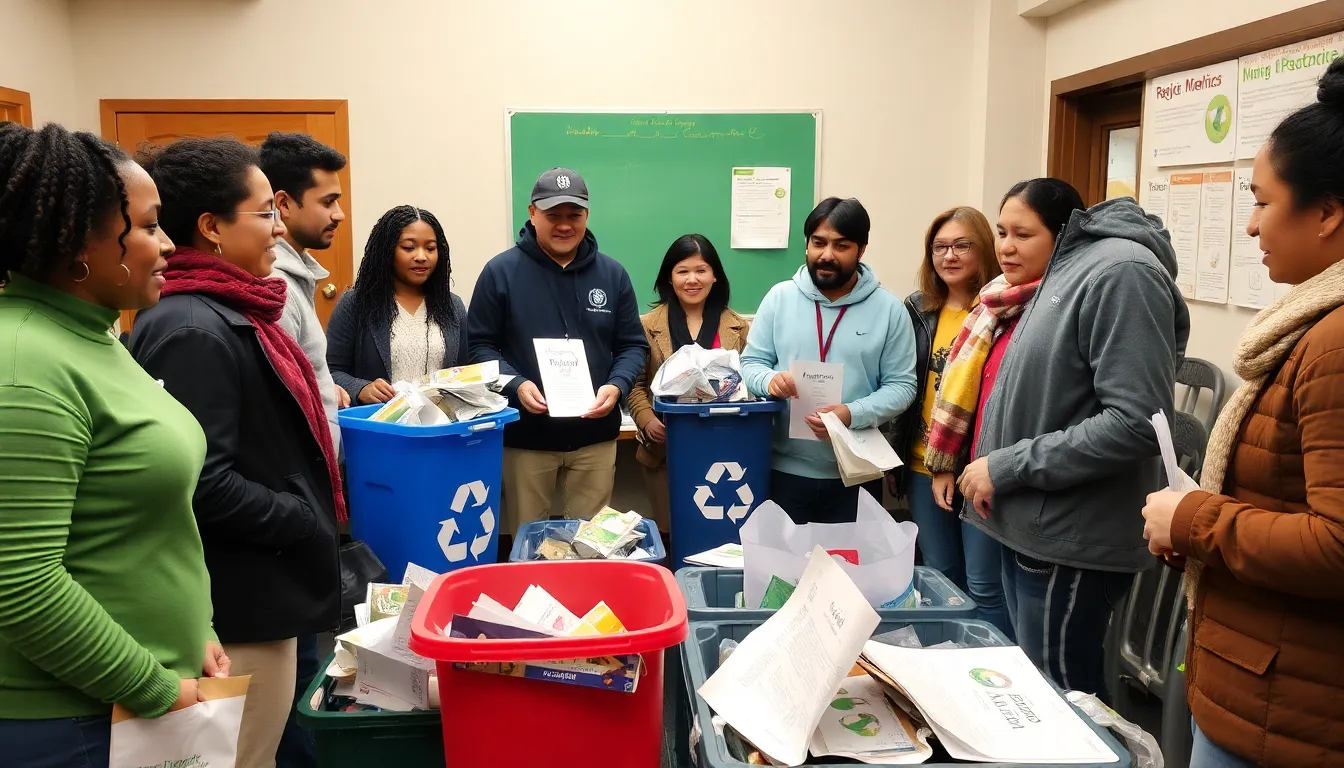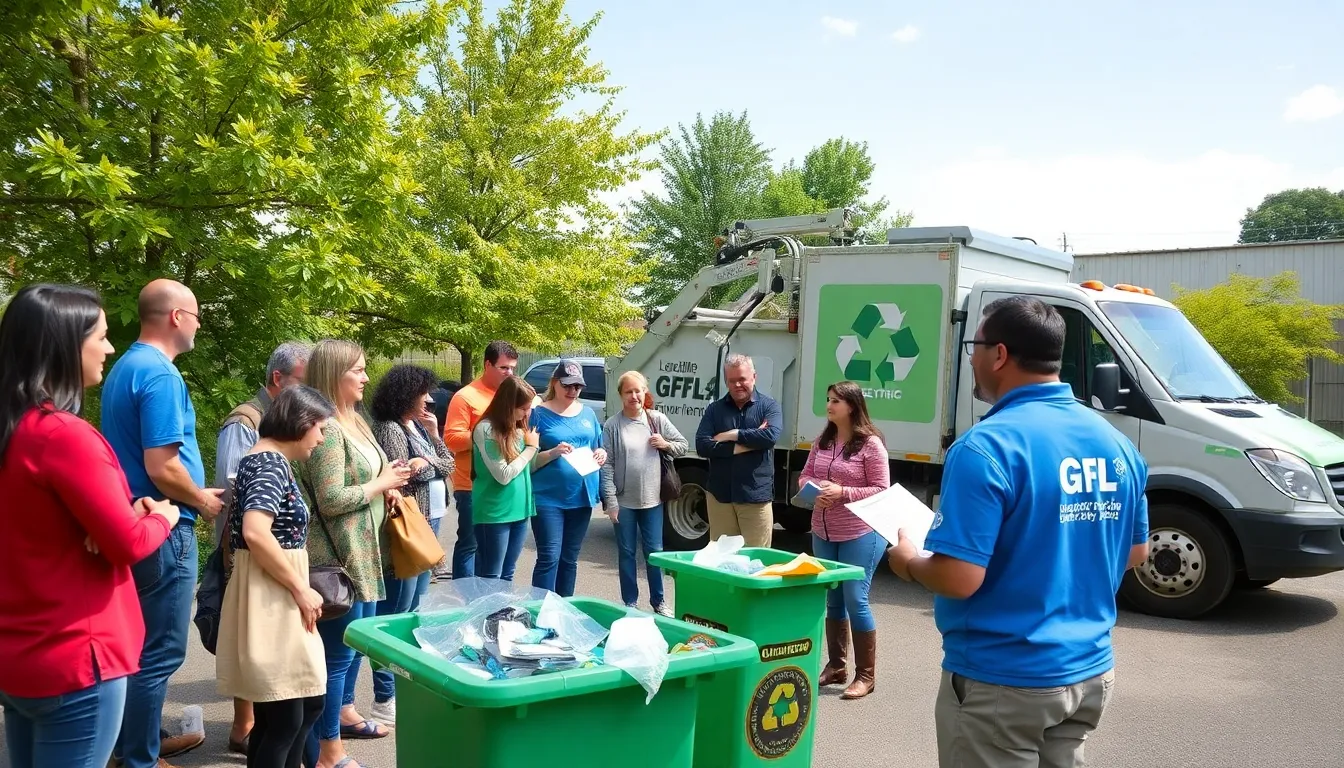In a world where trash can sometimes feel like it’s winning the battle against cleanliness, GFL Environmental is stepping up to change the game. This Canadian waste management powerhouse isn’t just about picking up your garbage; it’s leading the charge in innovative environmental solutions. With a commitment to sustainability that even Mother Nature would applaud, GFL is transforming how communities think about waste.
Table of Contents
ToggleGFL Environmental News Overview
GFL Environmental continues to expand its role in waste management while emphasizing sustainable practices. Recent reports highlight the company’s acquisition of various municipal contracts, enhancing service capabilities across multiple regions. Expansion into new markets such as the northeastern United States significantly strengthens its operational footprint.
Innovative recycling programs launched by GFL aim to recover more materials from the waste stream, promoting a circular economy. Community engagement initiatives support local efforts, educating residents on proper waste disposal and recycling practices. Increased use of technology in collection and sorting processes improves efficiency and reduces carbon emissions.
Financial performance stands out, with GFL reporting a revenue increase of 15% in the last fiscal year, driven by strategic acquisitions and organic growth. Partnerships with local governments reflect GFL’s commitment to public-private collaborations that benefit communities. Investments in infrastructure, such as advanced recycling facilities, position GFL as a leader in waste processing technology.
GFL’s emissions reduction targets reflect its dedication to sustainability, aiming for a 30% decrease by 2030. Collaboration with environmental organizations further highlights the company’s commitment to research and development in green technologies. The implementation of electric collection vehicles showcases GFL’s innovative approach to reducing environmental impact.
Regulatory compliance remains a priority, as GFL actively engages with stakeholders to ensure adherence to local and federal regulations. Their sustainability reports illustrate transparency and accountability in operations. Through these strategic initiatives, GFL Environmental is poised to lead the industry towards a more sustainable future.
Recent Developments in GFL Environmental

GFL Environmental continues to make strides in sustainability and environmental solutions through new initiatives and strategic investments.
New Initiatives and Programs
GFL has launched several innovative recycling programs aimed at increasing material recovery rates from waste streams. These initiatives promote a circular economy and engage communities with educational campaigns focused on proper disposal and recycling practices. Additionally, the company recently secured new municipal contracts that enhance service capabilities in various regions, especially in the northeastern United States. Community outreach efforts include workshops and partnerships with local schools to foster awareness on waste management. GFL seeks to change perceptions about waste and encourages residents to participate actively in sustainability efforts.
Investment in Sustainable Technology
Technological advancements remain a cornerstone of GFL’s strategy. Investments in advanced recycling facilities position the company as a leader in waste processing technology. GFL has prioritized the implementation of electric collection vehicles, contributing to reduced carbon emissions in its operations. Collaborations with environmental organizations drive research into innovative green technologies, supporting GFL’s ambitious emissions reduction goal of 30% by 2030. These efforts illustrate GFL’s commitment to integrating sustainable practices into its core operations and ensuring regulatory compliance. Stakeholder engagement remains strong, enhancing transparency and accountability within the company’s sustainability initiatives.
Community Impact of GFL Environmental
GFL Environmental actively contributes to community welfare through various initiatives and partnerships aimed at enhancing local environments.
Local Engagement and Partnerships
GFL emphasizes strong local engagement by collaborating with municipalities and organizations. Workshops are frequently held in schools to educate students about recycling and waste management. Partnerships with community groups foster awareness and participation in sustainability programs. Engagement efforts attract residents to participate in clean-up events and recycling drives, effectively boosting community spirit. Local governments benefit from GFL’s support through shared resources that improve waste management efficiency.
Environmental Preservation Efforts
GFL plays a pivotal role in environmental preservation through innovative recycling and waste processing technologies. Investment in advanced recycling facilities allows for higher material recovery rates, positively impacting landfill diversion. Initiatives aimed at reducing carbon emissions include the use of electric collection vehicles throughout operations. Collaboration with environmental organizations enhances research and development of green technologies. GFL’s commitment to setting a 30% emissions reduction target by 2030 demonstrates a proactive stance toward sustainable environmental practices. These actions collectively strengthen GFL’s reputation as a leader in environmental stewardship.
Challenges Facing GFL Environmental
GFL Environmental encounters various challenges in its pursuit of sustainability and waste management leadership. These hurdles impact operational efficiency and strategic growth.
Regulatory Hurdles
Regulatory compliance poses significant challenges for GFL Environmental. Various local, state, and federal regulations influence operations, requiring constant adaptation. Keeping up with evolving environmental standards necessitates dedicated resources and expertise. Fines or penalties may arise from non-compliance, making adherence critical. Engaging with stakeholders regularly helps GFL navigate these complexities by promoting transparency in operations. Compliance efforts ensure GFL maintains its commitment to sustainability while minimizing legal risks.
Market Competition
Market competition in the waste management sector is fierce, presenting obstacles for GFL Environmental. Numerous local and national service providers vie for contracts, often driving down prices. GFL faces pressure to differentiate itself through innovative services and sustainable practices. Securing municipal contracts becomes increasingly competitive, necessitating strategic partnerships and strong community engagement. A focus on innovation, such as advanced recycling technologies, aids GFL’s efforts to stand out. Success in this environment requires continuous improvement and adaptation to industry trends.
Future Outlook for GFL Environmental
GFL Environmental is set to expand its influence in waste management through ongoing strategic initiatives. Recent municipal contracts highlight the company’s growth, particularly in new markets within the northeastern United States. Enhanced recycling programs showcase GFL’s commitment to the circular economy, contributing to material recovery and community education on proper waste disposal.
Investments in advanced recycling facilities emphasize technological innovation. Electric collection vehicles will play a key role in GFL’s commitment to reducing carbon emissions. A reported 15% revenue increase reflects the effectiveness of these strategies, driven by both acquisitions and organic growth.
GFL aims for a 30% reduction in emissions by 2030, aligning with industry sustainability goals. Partnerships with environmental organizations foster advancements in green technologies. Regulatory compliance remains a priority, and active engagement with stakeholders ensures adherence to evolving regulations.
Challenges persist in achieving sustainability. Regulatory compliance requires adaptation to local, state, and federal changes, necessitating dedicated resources. Market competition pressures GFL to differentiate itself further, making the acquisition of municipal contracts more competitive.
Continuous improvement will remain vital for GFL’s success. Adapting to industry trends and customer demands is essential. Strong leadership in environmental stewardship positions GFL as an industry player focused on a sustainable future, despite existing hurdles.
GFL Environmental is making significant strides in waste management and sustainability. Its innovative practices and community engagement reflect a commitment to reshaping how waste is perceived and handled. As GFL continues to expand its services and invest in advanced technologies, it remains focused on achieving ambitious emissions reduction targets.
The company’s proactive approach to regulatory compliance and collaboration with environmental organizations further enhances its reputation as a leader in the industry. While challenges persist, GFL’s dedication to continuous improvement and adaptation will likely position it at the forefront of the waste management sector. With a clear vision for a sustainable future, GFL Environmental is set to make a lasting impact on communities and the environment.


